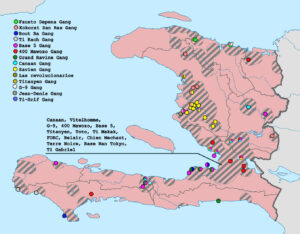by Maurizio Sacchi
Haiti sinks deeper and deeper into violence and chaos. It has been without a prime minister since 12 March, when Ariel Henry resigned after armed gangs prevented him from returning from Kenya, where he had signed an agreement to send a multinational security force to restore law and order.

Now Jimmy Chérizier, also known as Barbecue, whose criminal gangs control most of the capital Port-au-Prince, said he would consider laying down arms if armed groups could participate in talks to create a new government. “If the international community comes up with a detailed plan where we can sit together and talk, but not dictate to us what to do, we could put the weapons down.” He also said that any Kenyan forces enlisted in the country to strengthen security would be considered “aggressors” and “invaders.” The proposal is directed at the Presidential Transitional Council, supported by other Caribbean nations and the United States, charged with developing a plan to return Haiti to democratic rule. The United Nations spokesman Stephane Dujarric, made public the U.N. Secretary-General’s message to Haiti’s gangs to “put down their weapons.”
According to a United Nations report, as early as 2020 there were an estimated half a million legal and illegal weapons in a population of 11 million. That number has certainly increased in the past three years. According to the report arms and ammunition are smuggled by land, air, and sea from U.S.A. states such as Florida, Texas, and Georgia. There have been seizures at the country’s main ports, Port-au-Prince, Port-de-Paix and Cap-Haitien. Illegal weapons are hidden in shipping containers among donations of toys and clothes.
In July 2022, Haitian authorities seized a large quantity of weapons and 15,000 rounds of ammunition contained in a shipment from Florida bound for an Episcopal church in Haiti. Haiti’s borders are 1,771 kilometres of coastline and a 392-kilometre land border with the Dominican Republic, exceeding the capacity of Haiti’s severely understaffed and under-resourced National Police, Customs, Border Patrol, and Coast Guard and increasingly targeted by gangs.
The flow of arms is fed by an equivalent flow of dollars from drug trafficking, in which Haiti plays the part of the intermediate port of call between South America and the United States. Several airstrips built for humanitarian purposes after the devastating 2010 earthquake, now poorly monitored, are used for this purpose. Criminal gangs control ports, highways, infrastructure, customs offices, police stations, courts, prisons, businesses, and neighbourhoods. Virtually all parameters of insecurity, from homicides, sexual assaults, kidnappings, police killings, and emigration from the country, are on the rise.
On the cover photo, Jimmy Chérizier, also known as Barbecue. In the text, a gang’s maps taken from Wikipedia
























